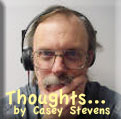- By Casey Stevens
- Opinions
 Print
Print  "The eye speaks with an eloquence and truthfulness surpassing speech. It is the window out of which the wind thoughts often fly unwittingly. It is the tiny magic mirror whose crystal surface removes a feeling fitfully playing like the sunlight and shadow on a quiet stream."
"The eye speaks with an eloquence and truthfulness surpassing speech. It is the window out of which the wind thoughts often fly unwittingly. It is the tiny magic mirror whose crystal surface removes a feeling fitfully playing like the sunlight and shadow on a quiet stream."- Henry Theodore Tuckerman, 19th century author and art critic
As I considered topics of consideration for this week's Thoughts, I ran across the above quotation. Though I had never heard of Mr. Tuckerman (and have cringed at the thought of professional critics, be they art, music, or literary), I realized that those words were touching on something of note that stood out in my limited contact with other humans this week.
I go to a grocery store or a coffee shop and think I have walked into an old-time western movie. Everyone looks like the proverbial bank robber, lower face covered, eyes protrude above the cloth, perhaps even a cap of some sort: Jesse James gang members pushing grocery carts instead of astride a horse, reusable bags of groceries and toilet paper instead of sacks of money purloined the First National.
It's the eyes. Their eyes.
Before the latest state pronouncement, there were plenty of faces still around. Those of us who perhaps had not procured masks, those of us who thought a mask was stupid, those of us who knew you would have to deal with steamed-up glasses, and those of us who thought social distance precluded sharing deadly germs and viruses.
I realized sometime during that interregnum between choice and mandate that a mask was just as much a social statement as a medical need. A mask, now, is kind of saying to a human near me that I realize, and I care, even if I rebel internally as, I daresay, many of us do rebel internally.
So, with mask across my face (bandit smiling beneath the cloth), I now traverse my small world and the Tuckerman quote rises in the cold spring and Ithaca air. The eyes around me.
Without the mouth, the chin, even the nose, the human edifice is reduced, or perhaps enhanced, by the eyes. Even my landlady didn't recognize me for a brief moment in the grocery store, then did so, I surmise, from my eyes.
The eyes of strangers.
We must now express ourselves in a muffled manner through mask or bandana, but we truly express ourselves with the unlimited potential of eyes, eyebrows, and the brow. The wideness of our orbs in surprise or happiness; our arched eyebrows, our thoughtful, perhaps furrowed brow. The only way to express our hearts and hurts with other than words. We look at another's eyes above bandit masks and discern what's really going on above and beyond our limited vocabulary.
The eyes express the heart, but only if we actually look in others' eyes, and I know that's tough for many of us.
For years on radio, I frequently had no eyes to look at, to discern when no guest was in the studio. Spoken words on the telephone with a caller could not give me insight into the heart, of soul. A guest in the studio was another kettle of fish – eye to eye, brother, eye to eye, sister. Here we are, and a lie is quickly exposed through the "window out of which the winged thoughts often fly unwittingly", as Tuckerman wrote. But eyes must reach across the few feet that separate them and reveal much if they meet.
The one who means so much to me pointed out that eye to eye is extremely uncomfortable for many, for any innumerable reasons. Which reminded me of being told that horses don't like eye to eye, even though they discern much with those huge brown orbs. We humans recognize that truth is undisguised in the eye, and many look away, thus shy from the intimate, soulful content of another's widened, childlike glance. The arched eyebrow, the laugh or cry, expressed without a word.
I'm a discriminating cinephile and I have found that truly great movies that stand the test of time and express the soul of "Kairos" seemed to depend on the actor's eyes and how the camera and director captured the eyes. Orson Welles knew this, Hitchcock knew this, Lumet knew it, Coppola knew it, Kubrick knew it. The eyes tell us what we need to know about the human before us, even with mask, even in the physical covering up that will eventually be shorn as the weather warms, as our world slowly and painfully recovers to a new economic and social reality. We mourn, too.
As we look, we see, we hope. We recognize another human through our imperfect, but discerning eyes, as windows to our souls. Charlotte Bronte wrote: "The soul, fortunately, has an interpreter: often an unconscious, but still a faithful interpreter, in the eye."
I encourage you: look at him, look at her. Try to understand, through their unmasked eyes, who they might be, who they are, who they want to be. And… I learn to see myself.
Take care of each other. Thanks for listening.
v16i18



